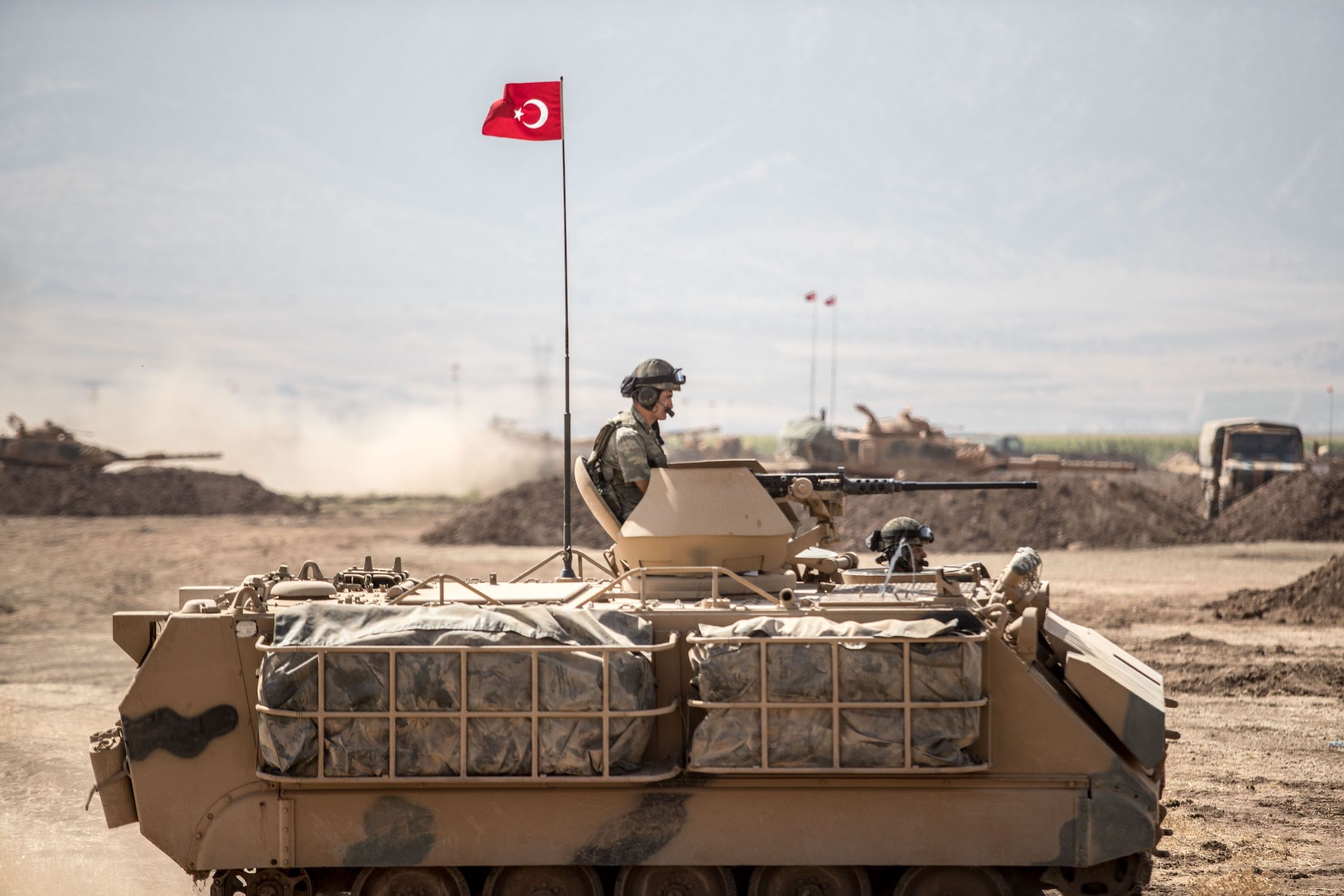Alwaght- While over the past years, the American occupation forces have been the key obsession of the Iraqis, the Turkish forces have been expanding their occupying military presence in the Arab country massively but quietly. This reality makes dealing with the Turkish occupation a national necessity for the Iraqi politicians and public after the US occupation is dealt with.
On Tuesday, local reports said that several rockets were fired at Zilkan military base hosting the Turkish forces in northern Iraq.
The attacks are coming while on February 1 the Turkish warplanes attacked Makhmur mountains in Iraq's Nineveh province under the excuse of targeting elements of Kurdish Workers' Party (PKK).
Reacting to incursions, Abu Alaa al-Wilaee, the commander of Sayed Al-Shuhada Brigades, a Shiite force founded along others in opposition to ISIS terrorist organization, said: "Our bad neighbor [Turkey] moves deep into the Iraqi soil calmly and without any deterrence or even opposing stances from our government; the same government that buries its head in the sand amid recurring incursions."
Two days after these remarks, a rocket attack on a Turkish base wounded or even killed 3 soldiers. Since April last year, Turkish launched several operations under the cover of fight against PKK, a group it has been fighting for over three decades, and even said it is likely to attack Sinjar region of Nineveh.
The new wave of pressures from Iraqi resistance groups against Turkey has been met with public support.
Turkish occupation and meaningful Baghdad-Erbil silence
Turkey's attacks on northern Iraq and the presence of Turkish troops in Mosul province under the pretext of fighting terrorism come as Turkey has openly and extensively put setting up military bases on Iraqi soil on the agenda. The central government in Baghdad and the Kurdish Regional Government (KRG) in Erbil have so far declined to take a significant stance in the face of these attacks and military entrenchment.
Firstly, over the past few years, the Turkish President Recep Tayyip Erdogan has tried to take control of a large part of Mosul, once an Ottoman wilaya, by adopting a neo-Ottoman doctrine in the region in violation of the Iraqi sovereignty. Although there are no accurate information and statistics on the Turkish bases and the exact number of Turkish troops in Iraq, without a doubt, the most important Turkish base is Ba'ashiqa in the east of Nineveh province. Formally called Ba'ashiqa Camp, it is located 22 kilometers north of Mosul and 100 kilometers deep into the Iraqi territory.
Reports also put the number of Turkish military bases in the Iraqi Kurdistan region at more than 19, of which 15 are military bases and four are for intelligence purposes. Reports indicate that the total number of Turkish troops in Iraq is between 2,500 to 3,000, most of whom are stationed at six permanent bases. Over the past two years, Turkey launched major operations, Operation Claw-Eagle (June 15, 2020), Operation Claw-Tiger (June 17,2020), and Operation Claw-Lighting and Thunderbolt (April 2021) in northern Iraq.
Secondly, the strange silence of the central government as well as the KRG has caused negative reactions from the Iraqi citizens. Undoubtedly, Turkey's invasion of Iraq is something that should be given more attention and protest by the government of Prime Minister Mustafa al-Kadhimi but so far no mentionable stance was made, something drawing protests from Iraqi public. But more important than Baghdad inaction is the unbelievable cooperation with Ankara and silence of Erbil rule, headed by the Barzani-led Iraqi Kurdistan Democratic Party (KDP). Public opinion in Kurdistan region find this silence as a kind of complicity of Barzani with Ankara against the PKK, while Turkey has used the PKK threat only as a instrument to occupy territories and advance its plans in Iraq and Syria.
Turkey and sham claim of anti-terror fight
Turkey's claims of anti-PKK fight are apparently false. Here is why:
1. Respect for the sovereignty of an independent state like Iraq is imperative under international law. Therefore, the encroachment of Turkish fighters and military forces on the territory of Iraq is illegitimate and unjustifiable according to legal standards under any pretext without obtaining permission from Baghdad.
2. The claim of fighting the PKK can only be considered as an excuse for Turkey's aggressive and occupying motives in Iraq. Looking at the deployment of Turkish troops in different parts of Iraq makes it clear to us that a large part of Turkish bases are located in areas where the PKK terrorist group has no active presence. For example, Turkey's presence in the Ba'ashiqa area of Mosul is in no way justifiable in terms of fighting the PKK. Even Ankara's argument about fighting ISIS in the region cannot be true because, on the one hand, the Iraqi government is responsible for countering ISIS activities within its sovereignty, and on the other hand, in 2018, the Iraqi government officially declared victory over the terrorist organization and the obliteration of the self-proclaimed caliphate of Abu Bakr al-Baghdadi, and there is no need for Turkey's role there.
3. As Turkey insists on its legitimate right to respond to threats on Iraqi soil, Iraq can also claim that because the PKK's main target is the Turkish soil, it can violate Turkish territorial sovereignty whenever it wants and attack PKK elements. A question: Would Turkey accept such a scenario or argument? The fact is that the PKK is not only a terrorist threat for Turkey but also the Iraqi government considers it a security threat that has an illegal presence in the country. With these interpretations, Erdogan should approve the argument that the Iraqi air force has the right to encroach on the Turkish territory chasing the PKK.
Turkish forces and two scenarios for Iraq
The indisputable fact about Turkish military actions on Iraqi soil is that the expiration date of Ankara's excuses and justifications has come, and the dominant demand of Iraqi citizens is that the occupying Turkish troops leave the country. Now, in the current situation, especially after the materialization of the threats of the Iraqi resistance groups against the military presence of Turkey, we can talk about two scenarios:
First scenario is based on continuation of the current strategy of occupation and massive military presence in Iraq, which would be of considerable consequences and costs for Turkey. Certainly, the resistance groups, as in the past years did not walk back from their push to expel the US —which is way stronger and more influential than Turkey— now would not take back their demand for the Turkish forces to leave Iraq. Therefore, the continuation of rocket attacks and the deaths and heavy casualties of Turkish troops in various bases can be predicted for the future. Undoubtedly, the continuation of Turkey's current approach raises the possibility of escalating tensions with Iraqi resistance groups, suffering the US fate in Iraq, creating a negative wave in Arab public opinion, reducing Turkey's soft power in the Islamic world, negatively affecting relations with Iran as the head of the Axis of Resistance.
The second scenario is that Ankara leaves Iraq within coming few months before experiencing what Washington experienced in Iraq. Such an approach would send signals of good faith and good-neighborliness to Baghdad. This not only would not weaken the Turkish national security but also paves the way for security cooperation between the two countries countries to check PKK moves.



























